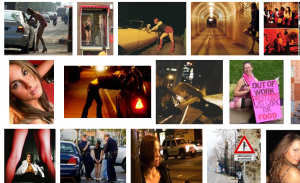Earlier this year, I taped a radio segment for the Judith Reagan show with Susie Bright and Sarah White. Both are intelligent, open-minded, and progressive women. But when Judith Regan read my provided bio (“Charlotte is a prostitute,”) each turned to me with raised eyebrows and smiles. There may have even been giggles. I had the impression they were offering me their support in the face of Judith calling me something rude. After all, “prostitute” still strikes most people as a dirty word.
Part of their reactions, in this circumstance, may have been inspired by Judith’s resonant, provocative delivery. (There’s a reason the woman’s given a microphone for three hours straight.) But part of it was probably the nakedness of the term. With “prostitute,” there’s no euphemistic softening of the reality as there is with “escort” or “companion” or “callgirl,” no prettying up of the transaction taking place. The difference between these terms is not fundamental; it’s all about presentation. If you do an image search for escort or callgirl, you’ll see a lot of pictures of traditionally attractive women in lingerie, posing against a bland background or somewhere indoors. If you image search “prostitute,” you’re going to see a lot of seedy settings and red light ambiance.

Those in the sex industry already know that classism runs rampant. Because of stigmatization, many sex workers work hard to distance themselves from work they frame as more degraded, immoral, or unpleasant. It’s an attempt to maintain their dignity in the face of a world that says they’re a bad, worthless person for commoditizing their sex appeal in this way. It leads to dominatrixes sneering at bodyrub providers, massage girls belittling “full service” prostitutes, indoor escorts denigrating street workers, and porn performers denouncing all prostitutes. Of course a professional submissive is not offering exactly the same service as a stripper, and those distinctions are valid. But the handjob-giving massage girl and the multi-hour “courtesan” aren’t protected from social scorn, blackmail, assault, or arrest by telling themselves they’re “not a prostitute.”
For me, “prostitute” is purely descriptive. It’s not a slang term designed to maximize offense; it is simply our most basic word for a person who has sex for money. I like its honesty. And I like its solidarity. Because when a sex working woman is arrested or murdered, the news coverage is going to call her a prostitute whether she used Craigslist, took referrals, or worked the streets.

Because I am a prostitute, the drama unfolding around the unsolved murders in Long Island has been hard to endure. I can admit, with shame, that my first response was to ignore it. I didn’t want to think about it, but that wasn’t an option for long. Soon there was a flood of media requests passing through my inbox, tons of hasty emails sent out to certain sex worker listservs from reporters who offered no background on their experience with or knowledge of sex work. I always want real sex worker voices to be part of the public discussions about our lives, but these requests infuriated me. I thought of all the amazing people I know who’ve shouted themselves hoarse about the importance of decriminalizing and destigmatizing sex work, of offering resources before judgment and punishment, of getting even the most basic aspects right when writing an article. I had so much anger, and I wanted to excoriate these journalists for coming for us now, when it’s too late for those murdered women, after countless salacious stories promoting the hateful rhetoric of ego-tripping politicians and academics with personal moral agendas and no sense of responsibility towards the people whose lives they’re gawking at and debating.
Nancy Goldstein sums all of that up when she writes “Some of those 10 people might be alive today if it hadn’t been for the lackluster response of law enforcement and the press coverage of the case — much of it sensationalist and dehumanizing — all because of the first victims’ sex-worker status.” Her entire article is full of heartbreaking, astute observations about the complete lack of sensitivity and compassion shown by various reporters and police, and about the ugly nature of prostitution’s illegal status. (Even if temporary amnesty is granted to sex workers with relevant information, as Melissa Gira Grant says, “the moment the killer is caught, any sex worker who came forward with information is likely still going to need to do sex work and will once more be a target for law enforcement.”)
Thank God for Melissa and for Audacia Ray, who is also quoted liberally in the piece. I’m still treading these confused waters of my own anger, hopelessness, and resentment to know where I might find a place as an activist in times like these. Right now, I’ve latched on to Audacia’s point about making our media in order to control the message completely and not trust a stranger to present it accurately. I’m excited to be part of a site that’s trying to do just that, even if I often feel lost about how I myself can do that effectively.

you have to speak for yourself because no one else will do it for you. there are 3 aspects that need to be addressed: 1) the labor justice aspects, 2) the social benefit of the work that is done, 3) the positive desire of some practitioners to do what they do. Labor justice because everyone deserves safety in their work. Social benefit in that the services are in constant demand throughout human history, a desired product is being provided, even death penalties do not deter, find ways to articulate that need that is served. 3) In any line of work some workers are only doing it for money, others like it a lot. In this field there is a layer of people being held against their will, while others are doing what they like to do. Those latter people need to constantly explain that they do and why.
You’re not doing a piss poor job, as you implied on Tumblr.
And it is really great to have this space, and others created and controlled by sex workers. I think that our safety and wellness – in a world that wants to fuck us while also wanted us dead and/or arrested – is paramount.
But I also think we need to keep pushing and going outside of our comfort zones when we are able to do so. Part of me wants to retreat to my community, commiserate and get support there, and stay in that bubble… but I know that nothing will change unless we can speak out to people who don’t support us, but would if they thought about it some more, if they saw a fellow human being with this experience in front of them. There are people who hate us – but there are also people who will listen. We need their solidarity if we are going to change things.
I really liked this, your links were insightful as well. I read your tumblr, and I think sometimes about your clients who are republican or politicians or business people who wouldn’t support sex workers rights or would even sign them away without batting an eyelash. People who have experienced you, shared intimate moments with you, known aspects of your humanity and still have the attitudes that they do. I ponder how those those things mix, or don’t mix, in their minds.
Unfortunately, being or seeing a prostitute can have immense social and familial repercussions. Sex workers themselves have the impetus to stand up and say something because it is their rights and their safety that is at stake, but clients don’t have that same motivation and are probably repelled at the idea of doing anything to out themselves.
Not all clients. But the vast majority.
I followed the case in Ontario (I’m from Canada) when the superior court of justice struck down prostitution laws. I sent people articles, and at first people were kind of confused/offended/disinterested but I feel over time I created enough intellectual dialog to “sway public opinion” in my small reaching circle of acquaintances, and reading you blog definitely helped me facilitate more meaningful discussion.
So thank you 🙂
I’m a big fan of your writing and, until the other day, loved to read your blog and tumblr posts. Now you’ve made them private I have to ask you here, for lack of any other way to do it: why? Why have you forsaken us(your non-client, non-stalker — I promise — public)? Come back!
Edward, I have the same question!
Tumblr is not the same without you, Nightmare Brunette. Although I understand what would prompt the change from a public blog to private, I still miss reading your posts nevertheless.